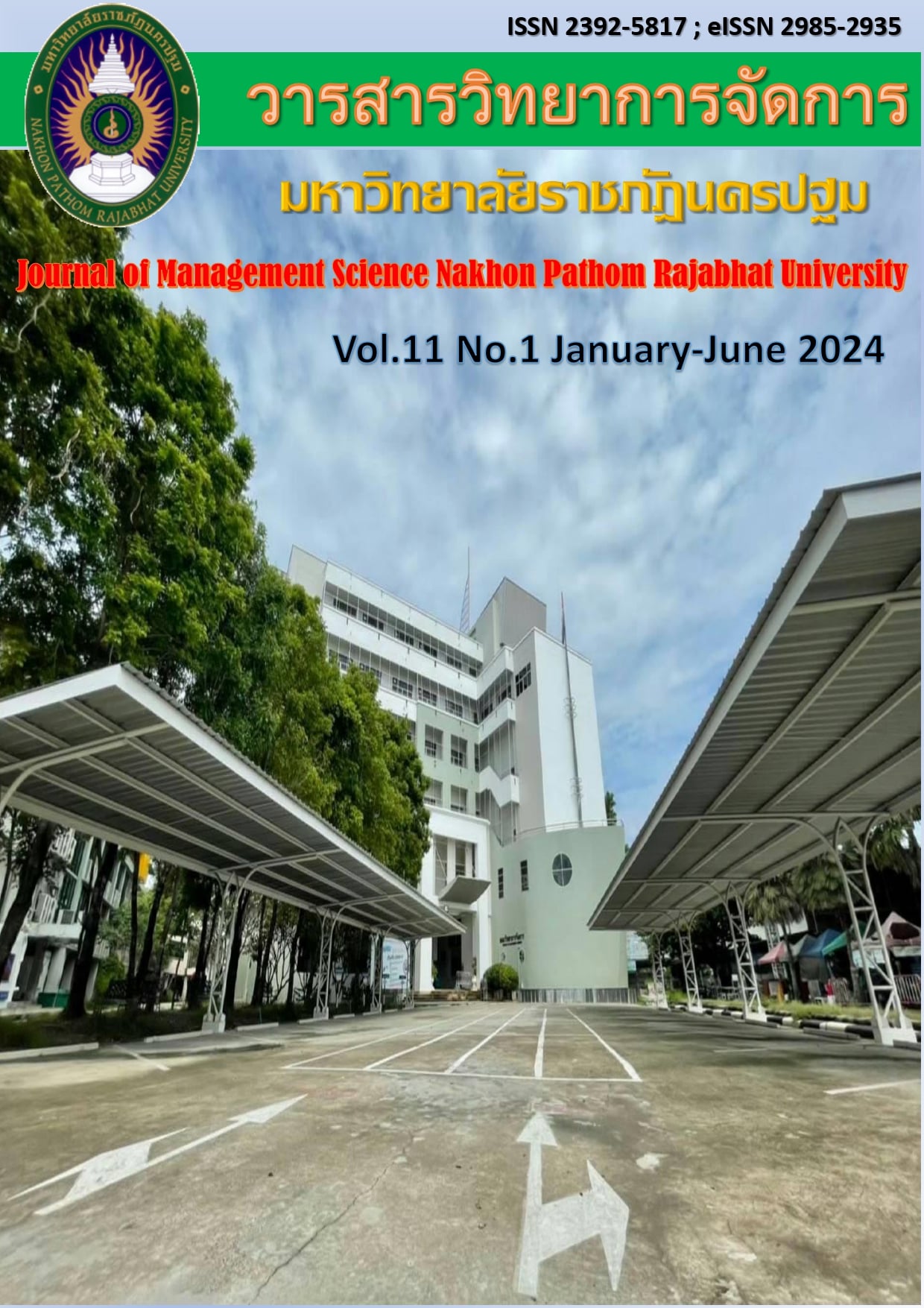Mutelu tourism: Wat Chedi (Ai Khai), Nakhon Sri Thammarat Province
Main Article Content
Abstract
Article history: Received 3 October 2023
Revised 18 June 2024
Accepted 20 June 2024
SIMILARITY INDEX = 7.30%
Article Details

This work is licensed under a Creative Commons Attribution-NonCommercial-NoDerivatives 4.0 International License.
The views and opinions of the article appearing in this journal are those of the author. It is not considered a view and responsibility of the editorial staff.
References
กร์ณนัฏฐ์ สิทธิไกร จินต์ วิภาตะกลัศ และกฤษณะ ดาราเรือง. (2562). คุณภาพการบริการและส่วนประสมทางการตลาดที่ส่งผลต่อประสิทธิผลของโฮมสเตย์ในภาคตะวันออกของประเทศไทย. วารสารสมาคมนักวิจัย, 24(3),149-166.
การท่องเที่ยวแห่งประเทศไทย. (2566). ททท.จัดงาน อะเมซซิ่ง มูติเวิร์ส”เปิด12 เส้นทางเที่ยวสายบุญตลาดสายมู. [ออนไลน์]. ค้นเมื่อ 1 สิงหาคม 2566 จาก https://www.pptvhd36.com/travel/thailand
ฉลองศรี พิมลสมพงษ์. (2550). การวางแผนและพัฒนาตลาดการท่องเที่ยว (พิมพ์ครั้งที่ 6). กรุงเทพฯ: มหาวิทยาลัยเกษตรศาสตร์.
เฉลิมเกียรติ เฟื่องแก้ว. (2563). ประสบการณ์นักท่องเที่ยว: แนวคิดและเครื่องมือ สําหรับธุรกิจการท่องเที่ยว. การประชุมวิชาการระดับชาติ ครั้งที่ 9. กรุงเทพฯ: มหาวิทยาลัยรามคําแหง.
นวิทย์ เอมเอก และปาริฉัตร ตู้ดำ. (2561). คุณภาพบริการ ภาพลักษณ์องค์การ และความพึงพอใจของลูกค้าที่มีผลต่อความ ตั้งใจเชิงพฤติกรรมของผู้โดยสารที่ใช้บริการรถไฟสายใต้. Veridian E-Journal มหาวิทยาลัยศิลปากร, 11(3), 1592-1610.
มติชนออนไลน์. (2560). มูเตลู. [ออนไลน์]. ค้นเมื่อ 1 สิงหาคม 2566 จาก https://www.matichon.co.th/
lifestyle/news_1398915.
ยโสธารา ศิริภาประภากร, สุทัศน์ ประทุมแก้ว และสุริยา คลังฤทธิ์. (2562). การส่งเสริมด้านการท่องเที่ยว ตามเส้นทางแสวงบุญในมิติทางศาสนา : กรณีการท่องเที่ยวเชิงวัฒนธรรมด้านศาสนา วัดโยธาประสิทธิ์ ตําบลนอกเมือง อําเภอเมืองสุรินทร์ จังหวัดสุรินทร์. การประชุมวิชาการ ระดับชาติครั้งที่ 6 มหาวิทยาลัยมหาสารคาม. มหาสารคาม: มหาวิทยาลัยมหาสารคาม.
วงใน. (2563). 20 ที่ขอพรสายบุญ สายมู. [ออนไลน์]. ค้นเมื่อ 1 สิงหาคม 2566 จาก https://www.wongnai.com/trips/temple-for-praying-and-mutelu.
ศิวนิต อรรถวุฒิกุล นรินทร์ สังข์รักษา และสมชาย ลักขณานุรักษ์. (2560). การพัฒนารูปแบบการจัดการ การท่องเที่ยวเชิงศาสนาของจังหวัดราชบุรี. Veridian E-Journal, Silpakorn University,10(2), 2392-1409.
อรรถพงศ์ ศรีตะลาลัย ,ชวลีย์ ณ ถลาง (2563). การท่องเที่ยวเชิงวัฒนธรรมในด้านความเชื่อเรื่อง “พญานาค”ของนักท่องเที่ยวชาวไทยในภาคตะวันออกเฉียงเหนือ(จังหวัดอุดรธานี-จังหวัดหนองคาย-จังหวัดบึงกาฬ-จังหวัดนครพนม)ประเทศไทย. วารสารวิทยาลัยดุสิตธานี ,14, 53-74.
อธิป จันทร์สุริย์. (2564). มูเตลู: ความเชื่อกับการท่องเที่ยว.วารสารทีทัศน์ 20(1), 220-240.
อุมารินทร์เลิศสหพันธ์และ พระครูปริยัติธรรมวงศ์. (2564). การพัฒนาคนรุ่นใหม่เพื่อขับเคลื่อนสังคมชาว พุทธ. วารสารบัณฑิตศึกษามหาจุฬาขอนแก่น, 8(1),10-23.
Adel, A.M., Dai, X., Roshdy, R.S., and Yan, C. (2020). Muslims’ Travel Decision-making to NonIslamic Destinations: Perspectives from Information-seeking Models and Theory of Planned Behavior. Journal of Islamic Marketing,12(4),918-940.
Ajzen, I. (1985). From intentions to actions: A theory of planned behavior. In Action control, New York: Springer.
Ajzen, I., & Fishbein, M. (2000). Perceived behavioral control, self-efficacy, locus of control, and the theory of planned behavior. Journal of applied social psychology, 32(4), 665-683.
Albaity, M. and Melhem, S.B. (2017). Novelty Seeking, Image, and Loyalty-The Mediating Role of Satisfaction and Moderating Role of Length of Stay: International Tourists' Perspective. Tourism Management Perspectives, 23,30-37.
Kusumawati, A., Rahayu, K.S., and Putra, E.W. (2022). Antecedents Customer Decision to Visit Yogyakarta as Special Regions in Indonesia. Cogent Business and Management, 9(1), 2050062.
Kandampully, J. (1998). Service quality to service loyalty: A relationship which goes beyond customer services. Total Quality Management, 9, 431–443.
Ko, M., & Pastore (2004). Similarity in leisure interests: Effects of selection and socialization in friendship. Journal of Social Psychology, 135, 471-482.
Kotler, P. (1997). Marketing management: Analysis, planning, implementation, and control (9th ed.). Prentice-Hall.
Kannan, R. (2020). PerceptionTowards Significance of Holy Places and Revisiting Intention of Religious Tourists in Himachal Pradesh. Medicine, 7(6),441-448.
MacKay, A., & Crompton, P. (1988). A model for the role of similarity of values in friendship development. British Journal of Social Psychology, 21, 301-310.
Parasuraman, A., Zeithaml, V.A., and Berry, L.L. (1985). A Conceptual Model of Service Quality and Its Implications for Future Research. Journal of Marketing, 49(4),41-50.
Rohman, I. Z. (2021). What Creates Tourist Satisfaction in Prambanan Temple? KINERJA, 25(2), 151-163.
Tegova, S. (2010). Application of the theory of planned Behavior to career choice: The role of an improved measure of emotion (Unpublished Master’s thesis) . Edith
Cowan University, Joondalup, Western Australia.

